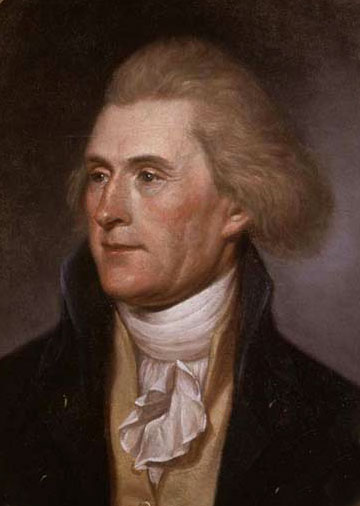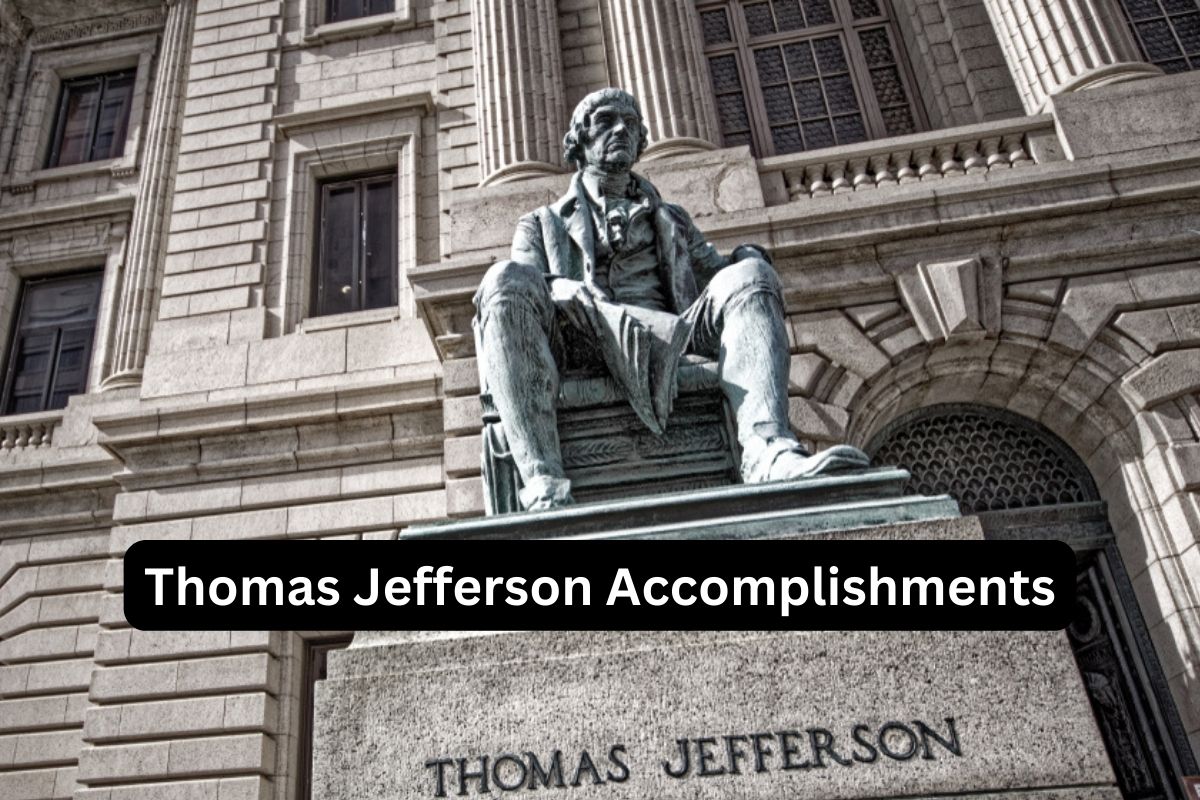Thomas Jefferson (1743-1826) was an American statesman, Founding Father, and the third President of the United States. Born in Virginia, Jefferson played a crucial role in shaping the nation’s early history.
He is best known for his role in drafting the Declaration of Independence, which declared the American colonies’ independence from Britain and established the principles of liberty and self-government.
Jefferson served as President from 1801 to 1809, during which time he prioritized reducing the size and power of the federal government, expanding westward through the Louisiana Purchase, and sponsoring the Lewis and Clark expedition to explore the newly acquired territories.
Jefferson was also a strong advocate for religious freedom, authoring the Virginia Statute for Religious Freedom, and he played a significant role in founding the University of Virginia. Jefferson’s accomplishments and ideas continue to shape American democracy and are revered as a cornerstone of American ideals.
Accomplishments of Thomas Jefferson
1. Drafting the Declaration of Independence
Thomas Jefferson is primarily remembered for his pivotal role in drafting the Declaration of Independence.
As a member of the Second Continental Congress, Jefferson was appointed to the Committee of Five, which was tasked with creating a document that would declare the American colonies’ independence from British rule.
Jefferson’s eloquent and influential writing style played a significant role in shaping the final version of the Declaration.
Also Read: Facts About Thomas Jefferson
Adopted on July 4, 1776, the Declaration of Independence outlined the colonists’ grievances, proclaimed their natural rights to life, liberty, and the pursuit of happiness, and justified their decision to separate from British rule.
It continues to serve as a symbol of freedom and human rights, not just for the United States but for people around the world.

2. Serving as the third President of the United States
Thomas Jefferson was elected as the third President of the United States in 1800 and served two terms from 1801 to 1809. As President, Jefferson prioritized several key initiatives that shaped the nation.
He focused on reducing the size and power of the federal government, cutting government spending, and reducing the national debt. Jefferson also pursued an agenda of territorial expansion and successfully negotiated the Louisiana Purchase in 1803.
Also Read: Timeline of Thomas Jefferson
This landmark acquisition from France doubled the size of the United States, opening up vast new territories for settlement and westward expansion. Jefferson’s presidency was marked by his commitment to republicanism, individual liberties, and agrarian ideals.
3. Louisiana Purchase
One of the most significant accomplishments of Thomas Jefferson’s presidency was the Louisiana Purchase. In 1803, Jefferson authorized the negotiation and acquisition of a vast territory from France, extending from the Mississippi River to the Rocky Mountains and encompassing the entire Mississippi River basin.
The Louisiana Purchase effectively doubled the size of the United States, adding approximately 828,000 square miles of land. This acquisition not only provided vital resources and access to valuable trade routes but also removed the threat of potential French presence on the continent.
The Louisiana Purchase is considered a major milestone in American history, as it set the stage for future westward expansion and helped solidify the United States as a continental power.
4. Lewis and Clark Expedition
As President, Thomas Jefferson sponsored the famous Lewis and Clark expedition, also known as the Corps of Discovery, which took place from 1804 to 1806.
Jefferson commissioned Meriwether Lewis and William Clark to lead a team of explorers on an expedition to explore and map the newly acquired western territories after the Louisiana Purchase.
The expedition aimed to find a practical route across the western half of the continent, establish trade with Native American tribes, and gather scientific data about the plants, animals, and geography of the region.
The Lewis and Clark expedition successfully journeyed from St. Louis, Missouri, to the Pacific Coast, charting and documenting new territories, forging relationships with Native American tribes, and greatly expanding knowledge of the American West.

5. Founding the University of Virginia
One of Thomas Jefferson’s significant accomplishments in the field of education was his role in founding the University of Virginia. Jefferson believed in the importance of education as a cornerstone of a democratic society. He designed and planned the university, which opened its doors in 1825.
The University of Virginia introduced several groundbreaking educational concepts at the time, including a decentralized faculty structure, a curriculum that emphasized liberal arts and sciences, and the use of elective courses. Jefferson envisioned the university as a place where students could pursue knowledge and critical thinking, preparing them for leadership roles in a democratic society.
Today, the University of Virginia stands as a testament to Jefferson’s vision and remains one of the most prestigious institutions of higher education in the United States.
6. Writing the Virginia Statute for Religious Freedom
Thomas Jefferson authored the Virginia Statute for Religious Freedom, which was passed in 1786. The statute is considered one of the seminal documents on religious liberty in American history. It was a significant step toward separating church and state and establishing the principle of religious freedom as a fundamental right.
The Virginia Statute for Religious Freedom declared that no individual should be compelled to support or participate in any particular religion and that the government should not interfere with an individual’s freedom of conscience in matters of religion.
Jefferson’s statute influenced the First Amendment of the United States Constitution, which later included the establishment and free exercise clauses, protecting religious freedom for all Americans.
Jefferson saw the statute as one of his proudest achievements and considered it to be one of his three most important accomplishments, along with the Declaration of Independence and the founding of the University of Virginia.
7. Promoting agrarianism
Thomas Jefferson was a strong proponent of agrarianism, a philosophy that emphasized the importance of agriculture and the virtues of rural life. Jefferson believed that the success and stability of a nation depended on an independent and self-sufficient agricultural society.
During his presidency, he implemented policies to support agricultural development, including promoting land distribution and encouraging westward expansion.
Jefferson also championed scientific and technological advancements in agriculture, advocating for the use of crop rotation, improved farming techniques, and the introduction of new crop varieties.
He saw agriculture as a way to create a prosperous and virtuous society based on self-reliance and the stewardship of the land.
8. Architectural design (Monticello and Virginia State Capitol)
In addition to his political and intellectual pursuits, Thomas Jefferson was also an accomplished architect. He designed and oversaw the construction of his famous home, Monticello, in Virginia. Monticello is a neoclassical masterpiece that reflects Jefferson’s architectural vision and personal style.
Jefferson incorporated innovative features and design elements, such as the use of natural light, unique floor plans, and a blend of classical and modern architectural influences.
Jefferson’s architectural expertise was not limited to his own residence; he also played a significant role in designing the Virginia State Capitol building in Richmond. The Capitol building showcases his classical design principles and remains an iconic landmark in Virginia.
9. Establishing West Point Military Academy
During his presidency, Thomas Jefferson signed legislation in 1802 that established the United States Military Academy at West Point, New York. The academy was founded to provide a formal education and training program for future military officers.
Jefferson believed in the importance of a well-trained and disciplined military to safeguard the nation’s security and uphold democratic values.
The United States Military Academy, commonly known as West Point, has since become one of the premier institutions for military education and has produced many distinguished military leaders throughout American history.
10. Contributions to natural science and exploration
Thomas Jefferson had a deep interest in the natural sciences and made significant contributions in this field. He was an avid botanist, geologist, and naturalist, conducting extensive studies and collecting specimens of plants, fossils, and wildlife.
Jefferson’s curiosity and scientific inquiry led him to expand knowledge in fields such as paleontology, biology, and meteorology.
His extensive collection of books, maps, and scientific instruments formed the foundation of the Library of Congress after it was purchased by the U.S. government in 1815.
Jefferson’s scientific pursuits and contributions not only furthered understanding in various disciplines but also fostered a spirit of scientific inquiry and exploration that influenced future generations of scientists.
